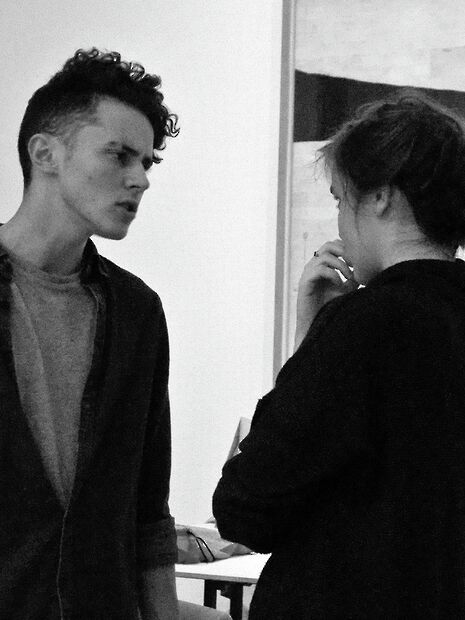Death and the Maiden
A taut and gripping psychological drama about those living in the aftermath of unforgivable political crimes.

‘I've always been too obedient’. In a line, Isobel Laidler captures the vulnerability and vengeful exultation of a woman who suddenly finds the man she believes to have violently raped her in her power.
This Downing Society production of Ariel Dorfman’s play, about achieving justice in a society emerging from a violent dictatorship, manages to combine thriller-tension with emotional poignancy. Paulina Salas, a troubled ex-political prisoner believes she has chanced upon the man who 15 years previously had sadistically raped and tortured her in captivity, to the strains of Schubert’s Death and the Maiden: An apparently kind stranger, who helped her husband after seeing him standing on the roadside with a flat tyre. Though blindfolded throughout her ordeals years before, she claims to recognise his voice and grows intent on extracting a confession at any price. This is to the horror of her husband, Gerrardo Escobar, a human rights lawyer who has just been appointed to a truth and reconciliation committee. Escobar is insistent on delivering lawful justice to heal his country’s wounds but is in anguished understanding of his wife’s visceral need to exorcise the demons haunting her past.
Burelbach as Roberto Miranda, doctor and accused, has the strange role of playing a character impossible to pin down. He stumbled over many of his lines, which were delivered with the pace and force of a steam-train, having a certain energy and presence which reached perfection expressed in cold rage gagged and bound onstage. His portrayal also credibly assumed both a strained comic value and an unprecedented sense of menace, with just enough moral indignation to maintain a fascinating ambiguity as to whether the man Paulina tied up in her kitchen and threatens with a gun really is her torturer.
Laidler is eerie, alluring and fragile as Paulina, first appearing nervously awaiting her husband’s arrival barefoot in a peasant dress. A marital spat involving the ill-timed loan of their car jack to her mother suggests that Paulina is not as submissive as she appears, and her physical transformation in the next scene, toting a gun in red lipstick and leather boots, is not lost on the audience. The ironic final line of the previous scene, “You can make us breakfast” rings out over the chaos that ensues. Laidler’s luxuriant performatism increases as the production goes on. She stalks the stage fingering the gun which, initially clutched in defensive fear, becomes an object of fascination for the power it gives her. That she goes on to speak to the husband she loves with the same calm contempt as her captive bears no inconsistency with her character’s fragility; but she has gained the sense of situational power and role-play that seduced her secret service captors into acts of unforgivable violence.
With a convincing chemistry between the married couple, a poignant revelatory scene punctuating the kidnap scenario creates an unease in its tonal inconsistency. They love each other, but the spectre of the past has driven something permanently between them.
Ben Breathwick is to be applauded for his febrile performance of Paulina’s anxious though outraged husband. What could have been a flat role to offset Paulina’s avenging, wounded woman with the conservative lawyer’s call for rules and order becomes a tense and intriguing performance in its own right. His role matures into a man struggling to reassert a sense of justice in the aftermath of a horribly oppressive governmental regime. The male alliance he forms to ‘humour’ his damaged wife is the less condemnatory due to his own professed insecurities about the expectations of masculinity.
The technical side of things was looser. There was a brief attempt at backlit projections which was too dark to be perceptible and bizarre for its singularity. Scene transitions were clumsily long and there was an irritating over-reliance on sound-effects and offstage dialogue to open scenes. The sound-effects themselves were superfluous and at times distracting, the significance of the car engine at the beginning of the show was quickly lost but was disruptive in its mediocre artificiality, so too the taped sound of a captive urinating offstage. Thankfully the Schubert wasn’t similarly overdone; though one felt that Paulina’s most acute sensory memory of her captivity and torture could have been used to more haunting effect. It felt a little as though the technical effects had been tacked on to something rehearsed as a displaced small-cast Corpus production into Downing’s Howard theatre. This is a pity, as the uninspired lighting and rather flat set might have emphasised the captivity and the remoteness of the family home to create a more intense atmosphere for the actors to work within.
In spite of this, the cast held their audience closely for the duration of the performance, with some beautifully gauged dramatic pauses and a gradual sense of character revelation. Death and the Maiden is an excellent production.
 Comment / Plastic pubs: the problem with Cambridge alehouses 5 January 2026
Comment / Plastic pubs: the problem with Cambridge alehouses 5 January 2026 News / New movement ‘Cambridge is Chopped’ launched to fight against hate crime7 January 2026
News / New movement ‘Cambridge is Chopped’ launched to fight against hate crime7 January 2026 News / Uni-linked firms rank among Cambridgeshire’s largest7 January 2026
News / Uni-linked firms rank among Cambridgeshire’s largest7 January 2026 News / Cambridge businesses concerned infrastructure delays will hurt growth5 January 2026
News / Cambridge businesses concerned infrastructure delays will hurt growth5 January 2026 Features / Who gets to speak at the Cambridge Union?6 January 2026
Features / Who gets to speak at the Cambridge Union?6 January 2026









